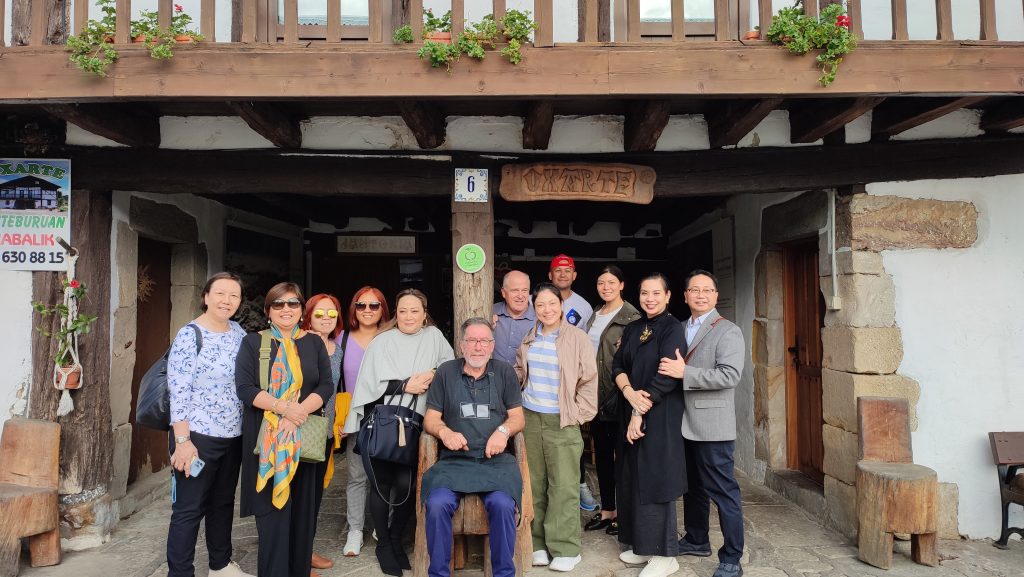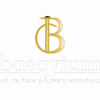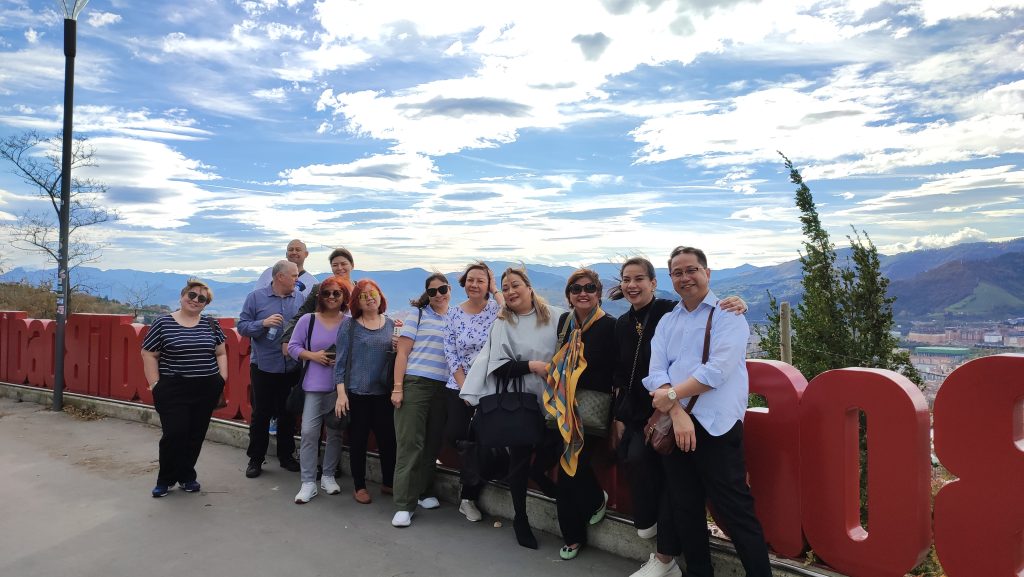Famous Filipino Chef Reggie Aspiras recently visited Basque Country with Basqvium. She learned about Basque culture and food during her stay. This is an interview in which she tells us how was the experience.
Reggie Aspiras: «Tourists appreciate the fact that, in Euskadi, food is a religion»
The famous Filipino chef finds that tradition and innovation are combined in the Basque Country’s kitchen during his gastronomic trips.
Eight days in Basque Country with chef Reggie Aspiras is an amazing food and culture experience. This journey goes beyond the culinary realm, exploring the rich tapestry of Basque culture. Aspiras, a famous chef, creates these immersive experiences with her brand, Kitchens of the World, in partnership with Basqvium.
She planned a trip to Euskadi, which included all three areas. She planned a trip to Biarritz, which is known as ‘The Land of Endless Feast.’ According to Aspiras, every meal in Biarritz is a celebration. There is an abundance of delicious food, and each place has its own special dish.
Therefore, Reggie Aspiras speaks from firsthand experience. She first visited the Basque Country in 2017. In 2021, she had a virtual meeting with Chef Paul Ibarra from Bilbao’s Los Fueros restaurant, organized by Basqvium. This meeting inspired her to embark on the Kitchens of the World adventure.
Food tour in Bilbao
The tour is not just about savoring exceptional food but also delving into culinary techniques. Participants visit esteemed establishments like Los Fueros, Rioja, Don Manuel, and Serantes in Bilbao. The itinerary spans diverse experiences, including a visit to the underwater winery Crusoe Treasure, a stroll on the Hanging Bridge, a stop at the Uxarte cider house, and exploration of iconic sites like Torre Loizaga and the Asador Etxebarri.
This trip includes cultural highlights like honoring the Virgen de Begoña, enjoying pintxos, and experiencing the traditional txoko. The tour showcases the region’s famed wines, including txakoli and Rioja alavesa, offering a holistic immersion into Basque gastronomy.
Reggie Aspiras carefully considers every detail, creating a seamless blend of culinary delights and cultural exploration. From the culinary prowess of Asador Etxebarri to the vibrant shopping experiences in Getaria, the tour captures the multifacetic essence of the Basque Country’s gastronomic and cultural treasures. For those fortunate enough to partake in this culinary escapade, it promises to be an unforgettable and enriching journey.

Shrimp and casseroles
—Feeling overwhelmed at any point?
—Hahaha. Definitely, in the first two days. Exploring cultures through food is phenomenal. I love the food in Bilbao and the Basque Country. Also, I enjoyed the txuleta and slow-cooked dishes at Los Fueros. I also rediscovered Paul’s prawns and had a great meal at my favorite restaurant, Serantes. The cazuelitas at Rio-Oja were delicious too. What I like about this place is that it offers both traditional and innovative cuisine. There is something for everyone and you can learn a lot.
—In your tours, it’s not just about the food.
—They involve learning recipes from the masters. The people I bring along can take a piece of the Basque Country with them. Food holds memories.
—Why did you decide to come here?
—Because here, food is a religion, a way of life, and tourists appreciate that. You can combine top-notch experiences with tradition. I don’t just want Michelin-starred restaurants; I appreciate them, but I love eating the way my mother used to feed me. That’s what I seek when cooking traditional Filipino food. You need tradition to progress, to introduce more modern elements. It’s sad when a place’s culinary tradition dies. And in the Basque Country, that tradition exists. I love the essence, the nature, the landscape. And good food within its landscape.
—Is there a connection with Filipino cuisine, which you’ve worked on and written about so much?
—There’s a lot in common, recipes and dishes. It’s the same but different; each has its flavors. These are recipes that take time. We make tripe with everything, blood sausage, bacon, ham. We make squid in its ink. It’s the same, but with local ingredients. And well, I make tripe like my mother does. You can’t replicate my recipe exactly; each has its way, its specialty.
—There’s a connection between both places, even if it’s forgotten.
—There are strong ties, whether we speak Spanish or not. There’s a special affection.
—Do you encourage Basques to make the journey in reverse, towards the Philippines?
Yes, everything is there: similar culture, beaches, 7,000 islands, shared history, and we are friendly. We have food-centered celebrations like here… there must be a special connection.


